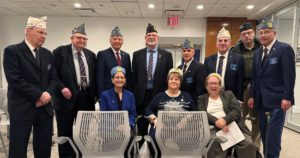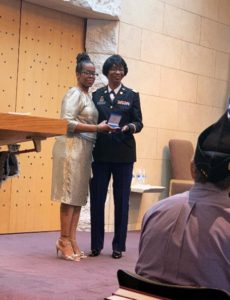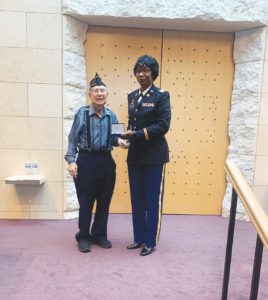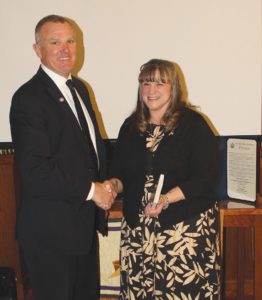By Bryn Garick, Managing Editor
JWV was honored to host Second Gentleman Douglas Emhoff at the annual NEC conference on February 21, 2024. Following a meet and greet with Jewish War Veterans, Jewish War Veterans National Ladies Auxiliary, and National Museum of American Jewish Military History leadership, National Commander Barry Lischinsky and Emhoff had a fireside chat.
Lischinsky began the conversation by thanking Emhoff for his participation at the NEC meeting and for his representation as the first Jewish White House principal.
Emhoff emphasized that it was an honor to participate in this event and that he takes his role in the White House very seriously.
Emhoff stated, “Coming into office a little over three years ago, I wanted to just live the way I had: open, proud, Jewish, and celebrate our faith and our culture.”
He elaborated on some of the events that he’s participated in such as the White House Hanukkah parties, and Seders. Emhoff detailed that he wants to continue to share the joys of being Jewish.
“And as well to fight against hate and antisemitism,” he continued. “In connection with that, one of the things I’m most proud of is the ‘National Strategy to Counter Antisemitism.'”
Emhoff noted his work with the administration and with Ambassador Deborah Lipstadt to develop this plan, the first of its kind. He explained that one of the elements of this plan is education.
“A lot of the antisemitism out there is because of a lack of knowledge, a lack of education,” Emhoff said.
He went on to explain that since the terrorist attacks of October 7, his work to combat antisemitism and all forms of hate has increased.
“Since then, I have basically been working nonstop to push back on this crisis of hate, this crisis of antisemitism that has arisen in conjunction with the administration,” Emhoff explained.
He detailed that he’s been working with the administration to make sure that Jews and all people are safe and secure to live their daily lives amidst this growing hate.
Lischinsky emphasized JWV’s members readiness to assist him and the administration in any way that they can.
Lischinsky asked Emhoff about his transition from private citizen to Second Gentleman.
Emhoff explained it as quite a transition and everything changed once his wife, Kamala Harris, became the Vice President. Though he emphasized that he proudly stepped away from his career to support her.
He continued, “It was all hands on deck and I raised my hand. And it was three plus years of representing this country. The way you all [the Jewish War Veterans] have represented your country in your roles, I had and still have that honor of being able to go around the country and go around the world saying ‘I represent the United States of America.’ It’s an honor of a lifetime.”
Lischinsky asked Emhoff about the ‘National Strategy to Counter Antisemitism’ that he had alluded to before. The ‘National Strategy to Counter Antisemitism’ was released in May 2023Emhoff described that the idea was born at the end of 2022 following a rise in antisemitism. He cited Charlottesville and the Tree of Life synagogue murders as examples.
“At the end of 2022, I knew I needed to do more. This was in the era of Kanye West was saying all these horrible things. I was in LA, and there was a billboard that said ‘Kanye was right about the Jews.’ I went back to the office and told my team we have to do something more. That something more lead to a convening of Jewish leaders at the White House, which then led to President Biden creating an interagency group to look at the issue and develop a plan,” Emhoff explained.
He continued that it was really a group effort to look at all forms of hate, but that the first deliverable was the ‘National Strategy to Counter Antisemitism.’
Emhoff paraphrased that the plan is based on four pillars: 1) education, 2) safety and security, 3) resources to counter growing online misinformation and 4) hate, and coalition building.
Emhoff further explained that since October 7, the group has done everything they can to uplift the plan including hosting continuous meetings and providing dedicated resources to communities.
Lischinsky noted that JWV was founded on similar principles including education to combat antisemitism, bigotry and hate. He continued on to ask Emhoff what keeps him up at night, which earned a laugh from the audience and Emhoff.
Emhoff replied, “Saving our democracy.”
He continued that it’s protecting the oath that the Vice President, service members, and all other United States representatives take to protect the Constitution and protect the country from enemies both foreign and domestic.
“That oath must be honored, each and every day. And sometimes, I know you all probably shake your heads at some of the things you’re seeing out there right now. Disregard for our rule of law, disregard for our Constitution, disregard for that oath. We all need to fight back and stand up for that, and you know what, sometimes that keeps me up at night,” Emhoff stated.
Lischinsky concluded by asking Emhoff if he had any additional thoughts on how his work combatting antisemitism and all forms of hate has changed following the October 7 attacks.
Emhoff responded, “The only thing I’ll add is the personal toll it has taken. Just like every other Jewish person and a lot of people who saw what happened on October 7. The shock, anger, rage. That coupled with the unfair blaming of Jewish people here in America, and just equating any action by Israel that they may not agree with and taking it out on all Jews.”
He continued, “But we have to keep talking about it, we have to keep reminding people, this happened. My wife, the Vice President, has been great. There are days I don’t want to do this, there’s days I do not want to speak about this. Every time I need to, she pushes me out there and says, you have a responsibility to do this and speak up about not only antisemitism, but about hate of all forms because it’s important.”
Emhoff closed by mentioning his father who served in the National Guard. He stated, “It’s something he was so proud of, and I loved when I was a kid, looking at pictures of him looking impossibly fit and young with his medals. It’s something that I am so proud of as his son to be say that publicly.”
He continued, “I came late to public service, I wish I could’ve done this earlier on, but I’m taking full advantage of this opportunity to do this public service. I love this country, I’m a patriot. So, to be able to serve and express my love for my country as the first Second Gentleman, and the first Jewish person in this role, it’s just an honor.”
Volume 78. Number 1. 2024





